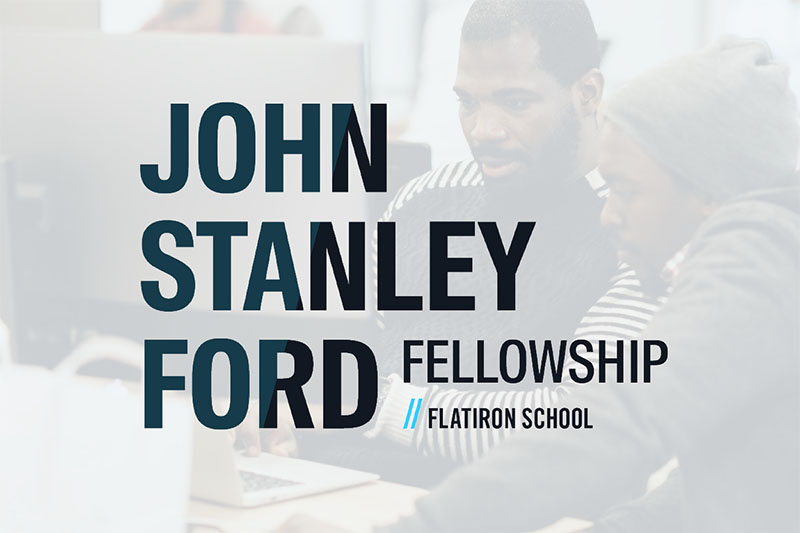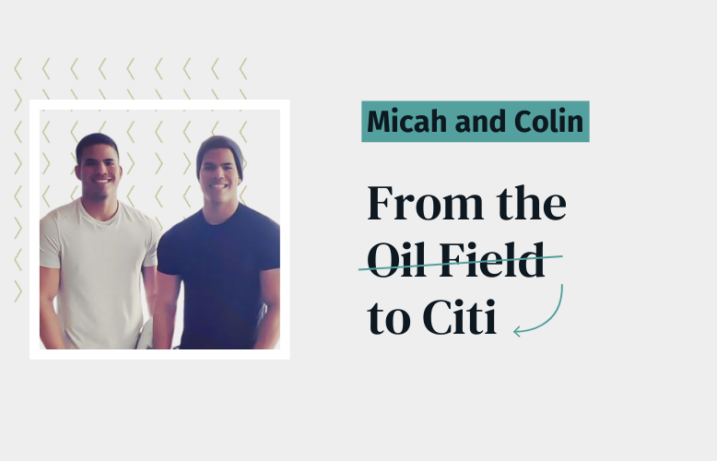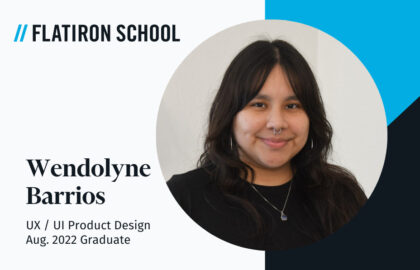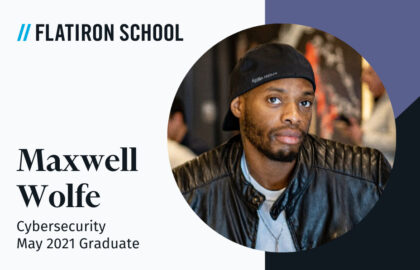We’re celebrating the 1st anniversary of our John Stanley Ford Fellowship for Black tech professionals at Flatiron School. The John Stanley Ford Fellowships (JSF) program, created in conjunction with the family of John Stanley Ford, America’s first Black software engineer, provides additional mentorship, networking, career counseling and apprenticeship opportunities for Black Flatiron School graduates. Our goal is to support more diversity in tech and help our students launch the careers they want.
To mark the JSF first anniversary, we talked with two Flatiron School graduates and John Stanley Ford Fellows—twin brothers Colin Mosley and Micah Mosley—about how the program helped them make a long-sought career change in the midst of the pandemic.
Micah and Colin are both University of Texas at Austin alumni who wanted to pivot from oil field engineering to tech. They chose Flatiron School and the John Stanley Ford Fellowship to make a successful transition. After a JSF apprenticeship with Citi, both recently accepted full-time offers there.

The interview below is condensed and lightly edited for clarity.
Why did you switch from petroleum engineering to software engineering?
Micah: There were multiple reasons. The first would be the lifestyle. We were both field engineers, so we had to go out to the location, work 12 hour shifts for 14 days, and then get seven days off. We worked in really remote locations, so we usually had to drive about an hour each way. It takes a big toll on your mental health and your body physically. Also, the culture in the oil field wasn’t a good fit.
We knew we wanted to leave. We just didn’t know exactly what we wanted to do. COVID decimated the oil and gas industry and we saw that as an opportunity to make a career transition. We were initially electrical and computer engineering majors, so we had experience with coding. We knew that we enjoyed it so naturally we were like, “Hey, maybe we should try this out again.”
How did you decide to do a software engineering bootcamp?
Colin: We didn’t really know what bootcamps were going into it. [We were talking with a] friend that’s a software engineer about going back to UT and getting another degree in computer science, and he brought it up and encouraged us to research our options.
In the end the advantages of just 15 weeks of fully committing–we were laid off, so we were like, “OK, we have the time.” We weren’t worried about learning for 10 hours a day, because we were used to working 12-hour shifts.
When did you find out about the John Stanley Ford Fellowship?
Colin: We committed to Flatiron but hadn’t started yet, and then we learned about the John Stanley Ford program. We were like, “Oh wow, this is a great thing that will help us in our job search.” And of course, it did end up helping us.
What was most helpful about the John Stanley Ford Fellowship program?
Micah: The most advantageous thing is having this network of people of color, getting to know other people that look like you in the industry. Having those connections is valuable. The mentorship, mainly from Karen [Nixon], was also valuable. It was nice getting her perspective of what to expect as a new hire.
Colin: With the John Stanley Ford speakers, the main thing was hearing their experiences. One speaker was 10-plus years into his career, and he showed us his struggles and what it’s like for successful Black people in software engineering.
What’s it like working full time after your JSF apprenticeship?
Colin: It’s been a great transition. We’re very fortunate to be with Citi, because they give you a lot of power to choose your career path. They also provide a lot of support. They give you a mentor right when you join, somebody that’s been there for a couple of years, so you have somebody to talk to and ask questions.
[The John Stanley Ford program] gives you so much help, even after you’ve already onboarded. We’re three months in now, and they still check in with us and answer any questions we have. The support that they and Citi provide has been tremendous.
What else should prospective John Stanley Ford Fellows know?
Colin: They send you additional opportunities to find a job outside of looking on [your] own. That’s a big help because obviously the job search is already stressful and having those job openings means you can get some interview practice even if you don’t get the job.
What advice would you share with other career-changers who want to retrain for tech?
Micah: Weigh your options. Self-taught would save money but it’s going to be harder to get interviews without a program to back you up. University would probably be the safest route but it’s going to take you longer. Bootcamp made the most sense for us because we felt like it would give us a good chance at being hired in a shorter timeframe than university.
Before you sign up for a bootcamp, take an online course if you’ve never done any coding, to make sure you like it. We did Harvard’s CS50 online course, and it took us a couple of weeks. We enjoyed it and so after that we were like, “All right, let’s do this bootcamp.”
The big piece of advice is that the bootcamp itself is not going to get you the job. What’s going to get you your job is the amount of work that you put in. Flatiron School does a really good job of giving you a cohort and resources that make it easy for you to learn as much as you are willing to learn, and there is plenty to learn if [you are] willing to put in the time.
You can check out Flatiron School’s free coding lessons here. Learn more about Flatiron School’s John Stanley Ford Fellowship, including how you can apply to be a Fellow, become a hiring partner or join the speaker’s program.




